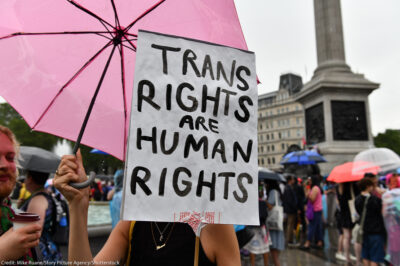ACLU Creates First-Ever HIV Education Curriculum For Homeless Shelters Nationwide
FOR IMMEDIATE RELEASE
NEW YORK — At a time when cities across the nation are cracking down on increasing numbers of homeless people seeking refuge from the winter, the American Civil Liberties Union today released the first-ever hands-on policy and practice toolkit for homeless shelters, focusing on the connection between HIV/AIDS, homelessness, and shelters, which could serve as a model education program for shelters nationwide.
The report, HIV and Homelessness: Policy and Practice, includes a five-part teaching guide, suggestions for improving conditions for residents with HIV, and a model non-discrimination policy that shelters are urged to adopt.
The toolkit, endorsed by the National Coalition for the Homeless, the National Health Care for the Homeless Council, and the National Alliance to End Homelessness, will be distributed by the groups to their vast national networks of homeless shelters, coalition partners, and newsletters.
The report emerged from the unusual settlement of a 1997 discrimination case brought by the ACLU on behalf of Patrick Keegan Biggers, a homeless man. Biggers, who has HIV, was evicted from a shelter in Maine two days before Christmas after shelter staff said that he was engaging in “dangerous behavior” because he talked about his health condition, touched dishes, set the shelter’s kitchen table, and asked to pick up a baby.
“It made me feel like a leper, like a castaway,” Biggers said of the experience. “I wanted to make sure that what happened to me would never happen to anyone else again.”
Instead of seeking money, Biggers asked the ACLU to negotiate a requirement that the shelter adopt a detailed anti-discrimination policy and implement an HIV education course for all residents and staff. The policy and the educational curriculum form the backbone of the newly-released ACLU report.
“If HIV discrimination drives the homeless out of shelters, then we have lost a unique opportunity to provide HIV education for those who are at especially high risk,” said Michael Adams, Associate Director of the ACLU’s AIDS Project and author of the report. “Discrimination is not only illegal and immoral, it creates a public health threat by defeating HIV prevention efforts, putting homeless people at even greater risk.”
In its report, the ACLU said that one-third to one-half of all people living with AIDS are homeless or at risk for homelessness. The toolkit addresses critically important HIV issues in shelters, including:
What an HIV non-discrimination policy should look like;
How to provide shelter staff and residents training on HIV-related issues;
Preserving confidentiality of HIV and other medical information;
Complying with the law by providing reasonable accommodations to people with HIV, including proper refrigeration and flexible meal schedules for medication;
Maintaining clean and sanitary conditions for everyone in the shelter;
Connecting residents to HIV-related services in the community.
“No one should be denied emergency shelter — or any other service for that matter — because of a disability,” said Mary Ann Gleason, Executive Director of the National Coalition for the Homeless. “We are delighted that the ACLU AIDS Project has prepared the HIV guide for homeless shelters, and are pleased that the Coalition could play a role in developing the guide.”
Nan Roman, President of the National Alliance to End Homelessness, also enthusiastically welcomed the report, saying that staff people at shelters need tools to help address HIV issues and that thoughtful materials would be a great benefit to staff and to homeless people who are forced to rely on shelters and other homelessness programs.
The National Health Care for the Homeless Council said the report filled an important training gap for service providers in homeless shelters. “Discrimination against persons with HIV and AIDS is absolutely unacceptable,” said John Lozier, Executive Director of the organization. “We are grateful to the ACLU for providing this valuable tool which health providers can use to work with shelter staff on the practical aspects of managing HIV/AIDS in the shelter setting.”
The report is available online at /hiv/gen/29150pub19991221.html.
Stay Informed
Every month, you'll receive regular roundups of the most important civil rights and civil liberties developments. Remember: a well-informed citizenry is the best defense against tyranny.




